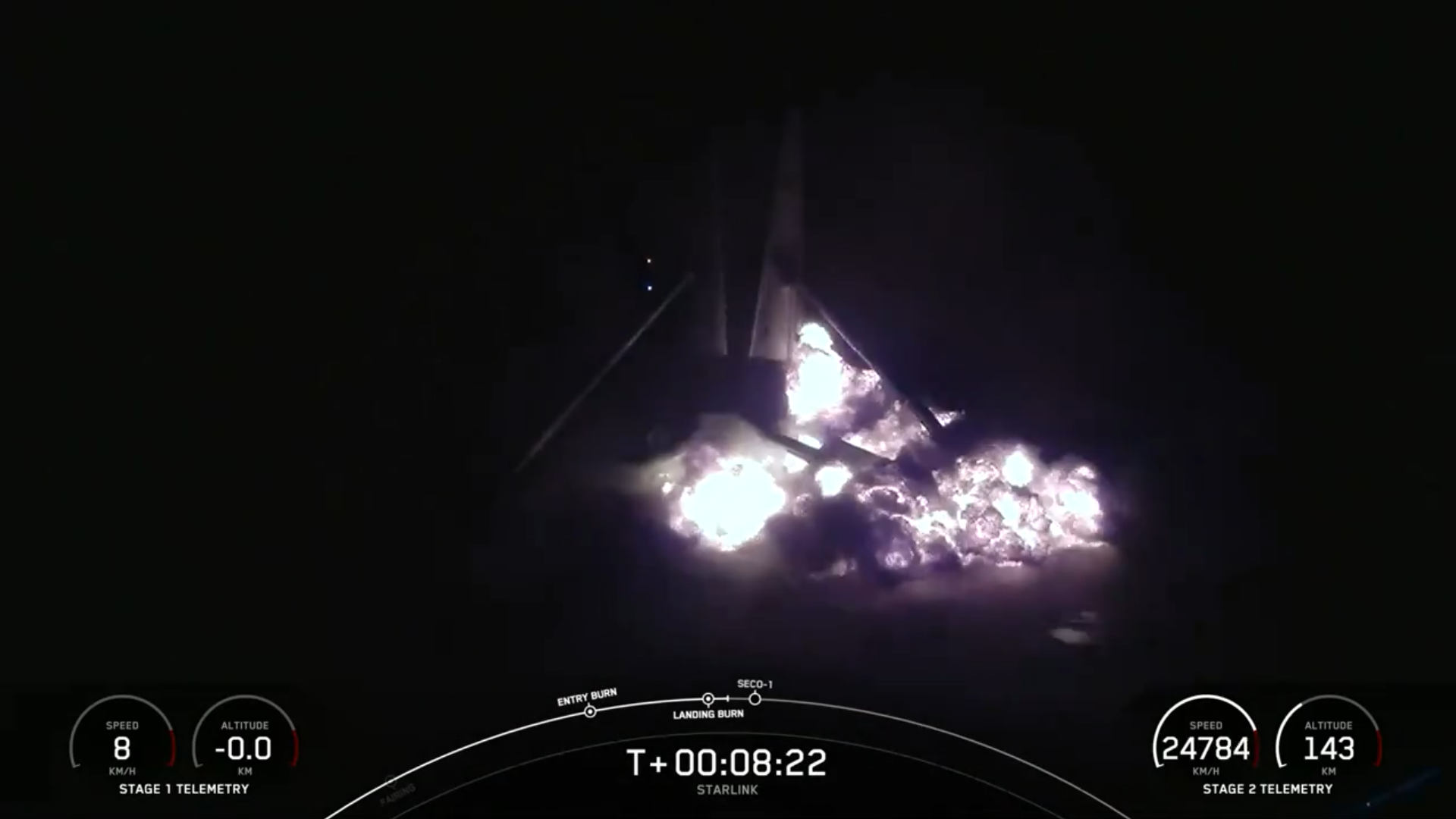
SpaceX's workhorse Falcon 9 rocket has been grounded, at least for a little while.
A Falcon 9 successfully launched 21 of SpaceX's Starlink satellites this morning (Aug. 28), sending them to orbit on the record-breaking 23rd mission for the rocket's first stage. That booster encountered a problem during its return to Earth, however, toppling over shortly after landing at sea on a SpaceX droneship.
The U.S. Federal Aviation Administration (FAA) announced today that it's requiring an investigation into the failed touchdown — and that the Falcon 9 won't fly again until that inquiry has wrapped up.
SpaceX will conduct the investigation, but the FAA will oversee the work and assess its findings.
"A return to flight of the Falcon 9 booster rocket is based on the FAA determining that any system, process or procedure related to the anomaly does not affect public safety," FAA officials said in an emailed statement.
"In addition, SpaceX may need to request and receive approval from the FAA to modify its license that incorporates any corrective actions and meet all other licensing requirements," they added.
Related: Starlink satellite train: how to see and track it in the night sky
Breaking space news, the latest updates on rocket launches, skywatching events and more!
It's unclear how long this process will take. But a relatively quick resolution is likely; SpaceX works fast, after all. The company returned the Falcon 9 to flight last month just 15 days after the rocket's second stage suffered an anomaly, which resulted in the loss of 23 Starlink satellites.
This morning's mishap was not as serious as that one, affecting only the rocket's landing; the Falcon 9's upper stage deployed the Starlink satellites into low Earth orbit as planned.
A grounding of even a few days, however, could affect a very high-profile launch that SpaceX is prepping for — that of Polaris Dawn, which will launch four people to orbit on a pioneering five-day mission that will feature the first-ever private spacewalk.
SpaceX had aimed to launch Polaris Dawn early this morning but called the attempt off due to projected bad weather. The company also ruled out an attempt on Thursday morning (Aug. 29) but has yet to set a new target date.
Join our Space Forums to keep talking space on the latest missions, night sky and more! And if you have a news tip, correction or comment, let us know at: community@space.com.

Michael Wall is a Senior Space Writer with Space.com and joined the team in 2010. He primarily covers exoplanets, spaceflight and military space, but has been known to dabble in the space art beat. His book about the search for alien life, "Out There," was published on Nov. 13, 2018. Before becoming a science writer, Michael worked as a herpetologist and wildlife biologist. He has a Ph.D. in evolutionary biology from the University of Sydney, Australia, a bachelor's degree from the University of Arizona, and a graduate certificate in science writing from the University of California, Santa Cruz. To find out what his latest project is, you can follow Michael on Twitter.
-
DanaBspaced It looked as if a landing leg failed to deploy, or collapsed. Not sure what the FAA's concern is. The booster worked well until it was on the landing pad.Reply -
Mike Crognale The video clearly shows a landing leg collapsing. Likely a failure of the locking mechanism. I suspect that the FAA has received some guidance "from above" to take some of the shine off of SpaceX now that NASA has been exposed as incompetent. Yes, I'm a cynic but given the sheer nonsense the the regime has tried to impose it's entirely plausible.Reply -
Unclear Engineer Grounding the whole fleet of launch vehicles seems somewhat extreme, unless there was actually an explosion before touch down.Reply
SpaceX is intentionally pushing the envelope to see how many times a booster can be flown, having started with 10, gone to 20 successfully, and now aiming for 40. So long as the "failures" are with SpaceX cargo-only payloads, or even after those payloads were successfully deployed, I don't see any public safety issues happening.
Having worked in technological bureaucracies and seen politics enter where it should not, I do wonder how much politics is being played here to justify keeping Boeing contracts going. The more SpaceX can be made to look less reliable for launch dates, the more important it is for NASA and especially Space Force to have other options. -
trailrider The FAA is (should be) responsible to insure public safety regarding aviation and space "incidents". In the case of the failure to land this particular unmanned booster on a remotely controlled, PRIVATE barge, out in the Atlantic Ocean, where is there a concern of public safety? Just looks to me like another instance of government attempting to control everything!Reply -
Miles777 Reply
In my opinion NASA should be investigated as to why they are even investigating this event. It's a real stretch to pretend that it has anything to do with "public safety" rather than "stick it to SpaceX."Admin said:The FAA is requiring an investigation into the failed touchdown attempt of a SpaceX Falcon 9 rocket's first stage after a successful Starlink satellite launch early Wednesday morning (Aug. 28).
FAA requires investigation into SpaceX Falcon 9 landing failure : Read more -
ChrisA SpaceX fanboys need to think. How can you say it is safe to fly the rocket if you have no idea what caused the problem? Likely it was a failed lock on a landing leg but no one knows this. What if it was a failed hydraulic pump where that just by chance happened on a landing and not on the accent? What if the problem were caused by a flawed flight readiness check process? The point is we don't know.Reply
Notice also that SpaceX grounded their fleet even before the FAA required it. They are smarter than their fans
Because the booster is available to inspect, I think this grounding will be short. If it does turn out to be a failed lock, then they can add "verify locks are not worn out" to the flight readiness procedure and they'll be good to go.
In all cases a failed landing points to something the engineers failed to think about or some incorrect assumption they made. My guess is they find it within a couple of weeks. -
COLGeek @ChrisA has a point. While much support for SpaceX is given by our community here (we are all about Space after all), I can assure you that ALL companies/organizations are treated the same by the FAA, from my experience. I spent more than a few years working with them while developing systems for DoD.Reply
Aside from all the hand-wringing and gnashing of teeth, don't you want space activities to be safe? Also from experience, having unintended projectiles (like a rocket) fall on your noggin is NOT a good time, I can assure you.
These processes exist for a reason. Misdirected fan adoration won't help. Let the processes work and we'll all be amazed by the results.
Just my $0.02. Keep the change. -
Unclear Engineer The difference between SpaceX stopping its launches to figure out why the booster was damaged on landing is substantially different from FAA grounding the entire fleet. FAA observing the SpaceX process and making the determination that it was inadequate, if they have a reason to believe that, would be a much less intrusive middle ground. Involving a bureaucratic decision is always going to be a time cost. The issue is whether the FAA really needs to be in the driver's seat for everything that doesn't work 100% perfectly at SpaceX. SpaceX had to push on the launch license for its StarShip tests to exclude some things from FAA's "mishap" declarations when the tests did not go 100% perfectly but obviously did not put any people at more risk than what the permit actually envisioned.Reply
This failed Falcon 9 landing occurred on a barge in an area where SpaceX had already determined that the weather was not good enough to launch the Polaris Dawn flight because an abort of that launch would have required recovery of the crew capsule in the same weather. So, the problem may have been in the judgement of SpaceX about what weather parameters were needed for barge landings. And, considering that it was the 23rd launch of this booster, maybe SpaceX was thinking to push the envelope with that particular piece of equipment, although I would think it better to keep that one going to see what wears out first with more launches.
Bureaucratic regulatory agencies always claim objectivity, but my experience in working at one is that the claim is not always true. There is almost always a tug-of-war between boosters and skeptics inside such agencies.
I have not worked at or with the FAA, but, from the outside, I am left to wonder how the agency permitted Boeing to launch StarLiner with its inadequate resolution of the thruster problems it had on its previous flight, but calls a "mishap" when SpaceX sends an uncrewed test rocket on a mostly successful test flight that shows real progress in developing the spacecraft and did not exhibit any failures that were not anticipated as possibilities before launch.
